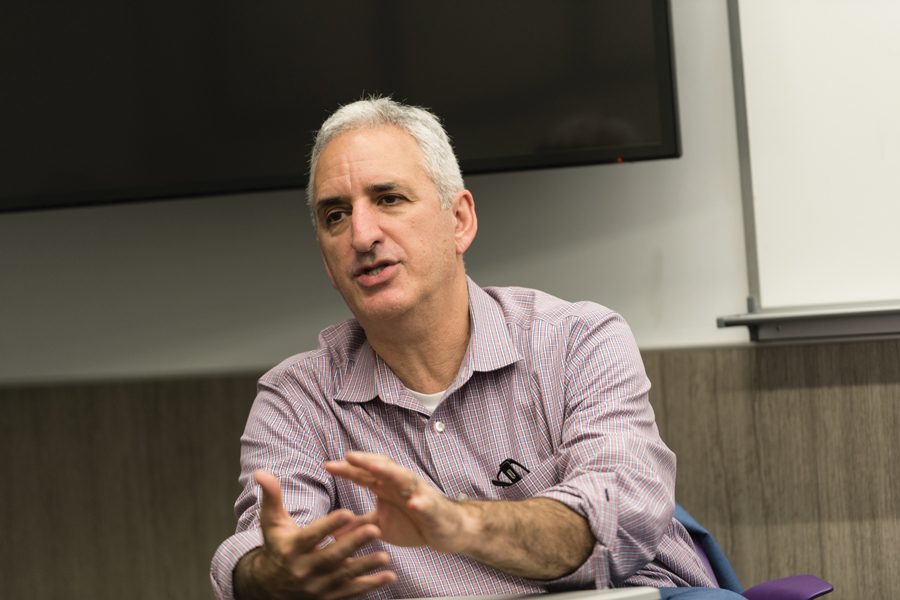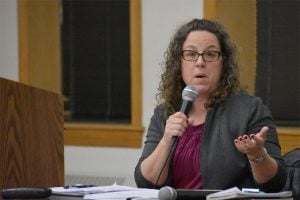Economist Bill Gale talks Fiscal Policy on the 2020 Campaign Trail and new book, ‘Fiscal Therapy’
Eva Herscowitz/The Daily Northwestern
Economist Bill Gale of the Brookings Institution at Wednesday night’s event. Gale discussed the problems with 2020 Democratic candidates’ proposed fiscal policies.
October 16, 2019
Economist Bill Gale of the Brookings Institution and Tax Policy Center discussed fiscal policy on the 2020 campaign trial and his new book “Fiscal Therapy: Curing America’s Debt Addiction and Investing in the Future” Wednesday.
SESP Prof. Diane Schanzenbach moderated the conversation, hosted by the Political Union at Kresge Centennial Hall.
Gale said raising revenues in a way that limits the burden on the middle class would be the most efficient way to undo the imbalanced national debt. He proposed that the United States impose a carbon tax, value-added tax, income tax, inheritance tax and corporate tax on capital gains, as well as get rid of the Tax Cuts and Jobs Act of 2017.
His book — released in April — identifies issues that contribute to rising national debt and proposes solutions to change tax and spending policy to stabilize the debt. He said while Congress acknowledges the current debt crisis, few members of Congress have been willing to take action on the increasing instability of the national debt.
“There are 535 members of Congress,” Gale said. “I would guess about 530 of them understand that this is a problem, but nobody wants to get out in front on it.”
Bienen junior and Political Union events coordinator Sachin Shukla said proposals like Gale’s have only begun to gain national attention recently.
“They’ve been floating around for the past two or three years, but now we have a reasonable chance of turning them into reality,” Shukla said. “At the same time, the debt problem is continuing to get worse. Both of those things occurring together makes having Bill Gale come in especially relevant.”
Gale’s emphasis on the importance of bipartisanship in negotiating the management of government spending comes at a key moment in the 2020 election.
“I feel it’s important, politically, that the Democrats don’t take each other down,” Gale said.
U.S. Sen. Bernie Sanders (I-Vt.) and U.S. Sen. Elizabeth Warren (D-Mass.) support Medicare For All, a system under which a single government-run plan provides insurance for all Americans. They argue that single-payer health insurance would reduce out-of-pocket expenses and prescription drug prices.
During Tuesday’s debate, Warren came under fire and dodged questions about whether her Medicare For All plan would increase taxes for the middle class. A full-scale single-payer health insurance program would cost about $34 trillion over 10 years, according to an Urban Institute study released on Tuesday.
“I think Warren made a mistake by endorsing Medicare For All,” Gale said. “I can see how we can get there from here on the financing side. I think the bigger issue is 175 million people have private health insurance. Switching them all off just seems like it could be quite complicated.”
Weinberg junior and Political Union co-president Molly Molloy agreed that healthcare is and should be a central issue to voters. She said that most of the Democratic candidates are doing well in representing the values of their constituents, which is the utmost priority in ensuring our elections are democratic.
Molloy also said Gale’s sentiments echo most sentiments on campus about how the job of the Democratic frontrunners should be to unite people and bring people together that aren’t used to doing so.
“Gale sees Warren as such a clear frontrunner,” Molloy said. “He thinks that taking what some might see as a divisive stance is only going to be detrimental to her beating Trump and actually making what she wants to happen happen.”
Eva Herscowitz contributed reporting.
Email: isabellesarraf2022@u.northwestern.edu
Twitter: @IsabelleSarraf





